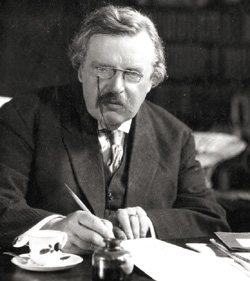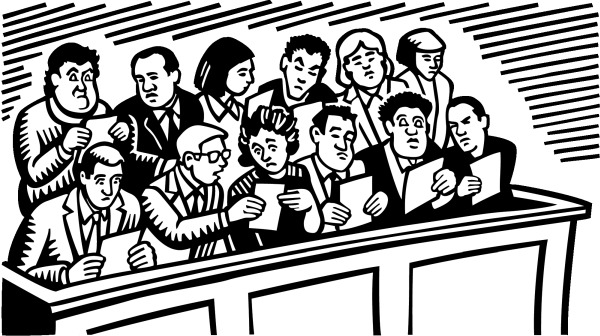Twelve Men.
.
by G K Chesterton
On
the paradox of entrusting ordinary people
with serious important things
an essay written for the Daily News in
London, Great Britain in 1906
[with paragraph headliners added by the
editor]

Who Was G. K.
Chesterton?
.
by Dale Ahlquist
Gilbert Keith Chesterton (1874-1936) cannot be
summed up in one sentence. Nor in one
paragraph. In fact, in spite of the fine
biographies that have been written of him, he
has never been captured between the covers of
one book. But rather than waiting to separate
the goats from the sheep, let’s just come
right out and say it: G.K. Chesterton was the
best writer of the 20th century. He said
something about everything and he said it
better than anybody else. But he was no mere
wordsmith. He was very good at expressing
himself, but more importantly, he had
something very good to express. The reason he
was the greatest writer of the 20th century
was because he was also the greatest thinker
of the 20th century.
Born in London, G.K. Chesterton was educated
at St. Paul’s, but never went to college. He
went to art school. In 1900, he was asked to
contribute a few magazine articles on art
criticism, and went on to become one of the
most prolific writers of all time. He wrote a
hundred books, contributions to 200 more,
hundreds of poems, including the epic Ballad
of the White Horse, five plays, five novels,
and some two hundred short stories, including
a popular series featuring the
priest-detective, Father Brown. In spite of
his literary accomplishments, he considered
himself primarily a journalist. He wrote over
4000 newspaper essays, including 30 years
worth of weekly columns for the Illustrated
London News, and 13 years of weekly columns
for the Daily News. He also edited his own
newspaper, G.K.’s Weekly. (To put it into
perspective, four thousand essays is the
equivalent of writing an essay a day, every
day, for 11 years. If you’re not impressed,
try it some time. But they have to be good
essays – all of them – as funny as they are
serious, and as readable and rewarding a
century after you’ve written them.)
Chesterton was equally at ease with literary
and social criticism, history, politics,
economics, philosophy, and theology. His style
is unmistakable, always marked by humility,
consistency, paradox, wit, and wonder. His
writing remains as timely and as timeless
today as when it first appeared, even though
much of it was published in throw away papers.
Chesterton debated many of the celebrated
intellectuals of his time: George Bernard
Shaw, H.G. Wells, Bertrand Russell, Clarence
Darrow. According to contemporary accounts,
Chesterton usually emerged as the winner of
these contests, however, the world has
immortalized his opponents and forgotten
Chesterton, and now we hear only one side of
the argument, and we are enduring the legacies
of socialism, relativism, materialism, and
skepticism. Ironically, all of his opponents
regarded Chesterton with the greatest
affection. And George Bernard Shaw said: “The
world is not thankful enough for Chesterton.”
His writing has been praised by Ernest
Hemingway, Graham Greene, Evelyn Waugh, Jorge
Luis Borges, Gabriel Garcia Marquez, Karel
Capek, Marshall McLuhan, Paul Claudel, Dorothy
L. Sayers, Agatha Christie, Sigrid Undset,
Ronald Knox, Kingsley Amis, W.H. Auden,
Anthony Burgess, E.F. Schumacher, Neil Gaiman,
and Orson Welles. To name a few.
Chesterton argued eloquently against all the
trends that eventually took over the 20th
century: materialism, scientific determinism,
moral relativism, and spineless agnosticism.
He also argued against both socialism and
capitalism and showed why they have both been
the enemies of freedom and justice in modern
society.
And what did he argue for? What was it he
defended? He defended “the common man” and
common sense. He defended the poor. He
defended the family. He defended beauty. And
he defended Christianity and the Catholic
Faith.
Excerpted from an essay, Who
Is this Guy and Why Haven't I Heard of
Him?, by Dale Ahlquist
|

